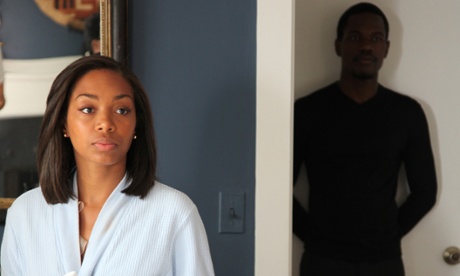
The transformative nature of blood has inspired deep thinkers of theology as well as the crass schlockmeisters of cheap-o horror. For Spike Lee, his newest picture Da Sweet Blood of Jesus is a hearty gulp from both glasses.
Shot on a shoestring budget (and partially crowdfunded through Kickstarter) this tale of hemato-addicted lovers has a few gross-out moments, but is more interested in stylized, jazzy performances set in manicured interiors with a high-definition snap than it is in jump scares. While the story could be reduced to a standard slasher of the VHS era, Lee's presentation is rooted in European arthouse cinema, resulting in a peculiar film that may be uneven, but is too unique and enjoyable to dismiss.
Based on Bill Gunn's 1973 cult film Ganja & Hess (originally recut as the more splatter-focused Blood Couple before a more recent resurrection) Da Sweet Blood of Jesus stars Stephen Tyrone Williams as Dr Greene, a blueblood scholar of African art and artefacts. He comes into possession of a cursed Ashanti blade that, after a run-in with his suicidal project assistant, ends up piercing him. Thus he is made invincible, but with this comes the thirst for human blood.
So far, fairly standard, but the opening 45 minutes play out in an energetic, disorienting swirl of remarkable production design, wall-to-wall music and mannered line delivery. There's a theatricality to the performances that may seem off-putting, but this is an artistic choice that has been evident in Lee's films since the beginning. Not until now, however, has he gone so all-in on rhythm and tone over a traditional plot.
After the first victims fall to our elegantly dressed hero's sanguine thirst (one of whom is The Wire's Felicia Snoop Pearson in a welcome small role,) we meet Ganja, the African British widow of the doctor's “missing” research partner. Ganja, played by the quite striking Zaraah Abrahams, joins Dr Greene at his high threadcount Martha's Vineyard home, and soon the pair declare their love for one another.
While their passion is certainly titillating (this is no PG film) the swiftness with which they fall head over heels is indicative of the movie's chief flaw. With such a focus on a slick look and feel there's almost no air left for the characters to resemble actual human beings. The performances are intriguing, but they are at such a remove that there's zero emotional connection with what's up on screen. The “rules” of this film's specific vampirism are intentionally hazy (are the victims dead? undead? aware of their fate?) and Dr Greene's snap transformation into a wily bloodsucker without the benefit of a learning curve is curiously frustrating. As a horror picture, quite frankly, it's a bit of a disaster.
But the film, as made clear in its hallowed title, has greater aspirations. There are no shortage of brooding monologues about redemption and honor and other large topics. (As well as a few breaks for humor, much of which springing from Rami Malek's turn as Dr Greene's manservant named Seneschal Higginbottom.) Not all of these solos work, but the movie's “hum a few bars and I'll fake it” attitude skates by, particularly with the benefit of the film's crisp, seaside location photography.
Other scenes travel to New York's underfunded hospitals and housing projects, and these are shot with a grit and grain added to the otherwise crystalline HD video. We also take a return visit to the church of Lee's recent Red Hook Summer for an extended gospel performance. The music is so electric and the sequence is cut together with such vigor you'll hardly mind that the repeated lyrics may as well declare “insert message here” as our main character waits for absolution.
Few film-makers are as idiosyncratic as Spike Lee and while this movie is unlikely to find mass acceptance, it is heartening to see him make something like this and Red Hook Summer in between his premium cable documentaries and larger budget fare like Oldboy. Da Sweet Blood of Jesus isn't entirely successful – and certainly offers few new insights into the nature of addiction – but it remains a welcome change of pace.

